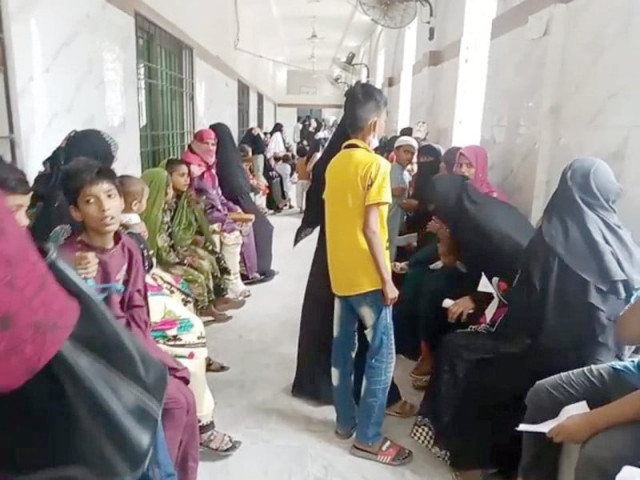Healthcare system buckling under growing population
Health experts say medical facilities in rural areas not up-graded for over two decades

Health facilities in the federal capital are falling short to cater to the needs of the residents especially the poor due to rising population of the city for the past 15 years.
Health facilities within Islamabad Capital Territory (ICT) were built years ago which are insufficient for over two million people residing in Islamabad. This infrastructure is not only responsible to provide medical facilities to the residents of Islamabad but also to patients from Gilgit-Baltistan, Khyber-Pakhtunkhwa, Azad Jammu and Kashmir and other areas.
According to a 2017 census, the population of ICT was 2,006,572, residing in an area of 906 square kilometres. The population density of the area is around 2,214 per square kilometre with the ICT having the highest average growth rate of 4.91 as compared to other parts of the country.
The population in rural areas was recorded to be 991,747 people with an inter-censual rate of 6.95, while the population in the urban areas was 1,014,825 with a growth rate of 3.48. It is expected that soon the population in rural areas will exceed the urban areas as an excessive number of people are inclined toward migrating to Islamabad.
A medical practitioner Dr Mazhar Naeem said that “health services in the rural areas have not been scaled up for the last two decades, resulting in the growth of quackery, unnecessary burden of providing primary healthcare by tertiary hospitals and dissatisfaction of citizens on the quality of services”.
“In terms of population, Islamabad has emerged as the tenth largest district of Pakistan with the highest growth rate in the country, mainly as a result of in-migration, with almost one million people living in the rural areas,” he added.
He said that there was a comparatively better situation at public sector hospitals in the capital as compared to other areas yet there are disparities and challenges that need to be addressed because of continued population influx and ever-rising need of quality and specialised treatment of diseases.
The existing hospitals also need immediate restoration with extended facilities and state-of-the-art health services not only for locals but also referral specialised services for patients pouring in from far-flung areas of Gilgit Baltistan, Khyber Pakhtunkhwa, Azad Kashmir and parts of Punjab, he said.
“We have seen rampant growth of quacks involved in illegal medical practices owing to insufficient healthcare facilities in the capital. They are taking advantage of the limited number of public sector hospitals and the increasing number of patients,” said a citizen named Saleem Khalid.
“There is a dire need of extended healthcare to facilitate poor patients as the affluent can easily afford treatment at private hospitals,” he added.
Official statistics show 19 health facilities presently functional in rural areas including three RHCs, 15 BHUs and one dispensary under the control of ICT health department. There are three major hospitals, PIMS, Polyclinic and CDA Hospital, functioning under the health department and Capital Development Authority besides 64 dispensaries and health centres.
Moreover, setting up Islamabad General Hospital with the financial assistance of the Saudi government has been approved. “A plan has been devised to establish 13 more primary health centres within the ICT jurisdiction to cater to healthcare needs of the growing population and ease pressure on tertiary hospitals,” said an official at Islamabad District Health Office (DHO).
“We have also sent a summary to Health Ministry seeking appointment of 358 medical officers for these health facilities to be set up mostly in far-flung and rural areas of the ICT,” he said.
Ministry of National Health Services sopkesperson Sajid Shah said sufficient allocation has been made under the Public Sector Development Program (PSDP) to ensure better health facilities for the capital residents.
“The government has also allocated Rs250 million for the establishment of a cancer hospital in Islamabad and Rs100 million for a Community Health Centre (CHC) at Bokra. An amount of Rs170.318 million has also been allocated for strengthening Mother and Child Health Services at Bhara Kahu,” he added.
He further said that Rs25 million have been allocated for the extension of the intensive care department of Mother and Child Health Centre and Children Hospital. He said Rs495 million are allocated for the up-gradation of the Neurosurgery Department and for the provision of essential equipment to PIMS hospital Islamabad. He also said the government has allocated Rs73.675 million for machinery and other equipment in the OPD block of Polyclinic besides allocating Rs96.640 million for the strengthening the Diabetes and Endocrinology Department at Polyclinic hospital.
Published in The Express Tribune, December 12th, 2022.


















COMMENTS
Comments are moderated and generally will be posted if they are on-topic and not abusive.
For more information, please see our Comments FAQ